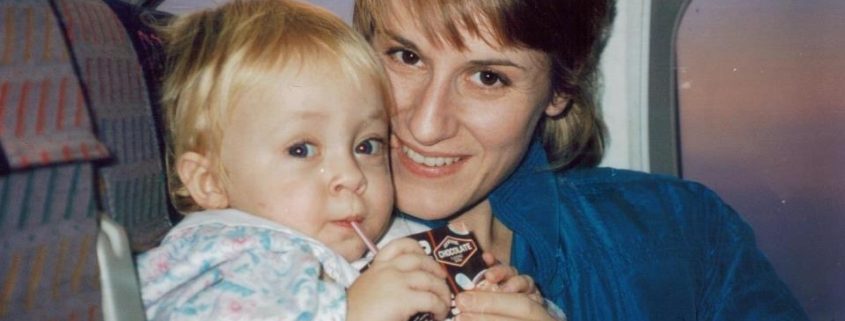A Vast Connection to Transplantation
Alexandra (Allie) Biess was born on her due date, September 17, 1993. She was a full-term, 8-pound, 11-ounce baby.
Allie was Maribeth and Larry Biess’ first child. She was a little jaundiced at birth, which is not abnormal for a baby, so her doctor suggested phototherapy to resolve her condition.
After six weeks, Maribeth returned to work and hired an experienced babysitter to help her with Allie.
“She told me, ‘There’s something wrong with your baby. You need to go to the doctor immediately,” Maribeth recalled.
The pediatrician was surprised to see Allie was still jaundiced. He suggested blood work followed by a nuclear medicine test. The test results suggested a problem with liver function.
Pediatric gastroenterologists further reviewed Allie’s results and discussed the possibility of obstructed bile ducts, a rare condition known as biliary atresia. The only way to be certain was to perform exploratory abdominal surgery.
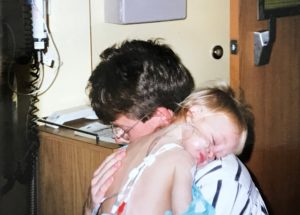
Allie held by her father, Larry, at the University of Chicago’s hospital.
At 10 weeks, Allie underwent surgery. The surgeon confirmed biliary atresia and performed a Kasai procedure in which Allie’s gallbladder and damaged bile ducts were removed and replaced with a section of her intestines. The doctors said they would need to perform another surgery in three months to see if the Kasai was working.
“After that, I was told, ‘It’s the worst case scenario. Your daughter needs a liver transplant, but she’s too small. Keep her alive until she’s big enough for doctors to get their hands in her abdominal cavity,’” Maribeth said. “We never allowed it into our minds that she wouldn’t survive.”
The Biess family began exploring options. Larry visited the local university library and learned about living-related liver transplants. The University of Chicago, at the time, was a leader for living-related liver transplants, and the family traveled to Chicago, where Larry was tested first for compatibility; however, Maribeth was a better match.
On January 2, 1995, Maribeth donated a portion of her liver to her 15-month-old daughter. The surgery lasted eight hours.
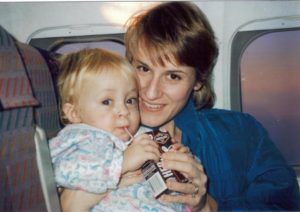
Allie returning to Jacksonville with her mother, Maribeth, following Allie’s transplant.
Growing up, Allie was admitted to the hospital often. Anytime she was exposed to childhood sicknesses, such as the chicken pox, she had to be hospitalized.
“We tried to treat her like a normal kid and not protect her from normal kid things,” Maribeth said. “For the most part, she didn’t know anything was wrong with her.”
Allie had blood drawn weekly for the first two years of her life, and then every two to four weeks after that. She became so familiar with the routine that when she was about four years old, she asked her phlebotomist, “Are you sure you shouldn’t be using a butterfly needle?” The nurse told the phlebotomist Allie was right, that a butterfly needle worked best on someone her age.
That inquisitive nature kept Allie persevering forward, without major setbacks and in relatively good health.
In fourth grade, one of her doctors at Wolfson Children’s Hospital in Jacksonville recommended Camp Boggy Creek to her. The Eustis, Florida camp is for children with serious illnesses. While Allie would not be as sick as some of the others in attendance, the doctor insisted the campers would be given hope by being around a peer who was doing well.
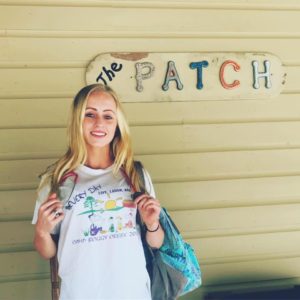
Allie as a counselor at Camp Boggy Creek.
Allie loved Camp Boggy Creek. Each week was comprised of children with different groups of conditions. Because there were not many other kids with transplants, Allie went to the “blended” week. She remained a camper for six years, then became a “leader-in-training,” and eventually a counselor.
“The goal was to find fulfillment and joy in helping kids in need, and I think that inspired me to pursue nursing,” Allie said. “There’s fulfillment in gearing life toward helping others achieve what they want to do.”
Allie attended nursing school at Florida State College at Jacksonville and the University of North Florida. She works as a registered nurse at Baptist Medical Center Jacksonville in the medical intensive care unit (MICU). She also works part-time in Memorial Hospital’s ICU. She wants to go back to school to become a nurse anesthetist.
“I’m grateful and lucky to have a donor,” Allie said. “If you’re going to get a second chance at life, make it count.”
Allie’s connection to transplantation does not stop with her, though.
In February 2020, Allie got engaged to Tony Benso, firefighter and paramedic with the Jacksonville Fire and Rescue Department. Tony’s father, John, received a heart transplant on August 24, 2019, at 63 years old.
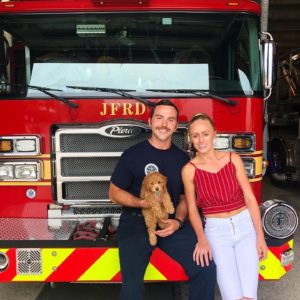
Allie and Tony at his fire station with their dog, Raleigh.
“I’m thankful my dad’s still here,” Tony said. “It’s an important time in my life. If my dad wasn’t around for it, it’d be upsetting. For him to be saved by someone’s heart, it’s an amazing gift.”
The Benso family has a history of heart disease. Both John and Tony were nearly 300 pounds at their heaviest. Tony lost 100 pounds in a couple months during high school. John had elastic lap band and gastric bypass surgery, but those had complications, resulting in more heart damage. John was diagnosed with ventricular arrhythmia, which caused his heart to have abnormal heartbeats and sometimes stop.
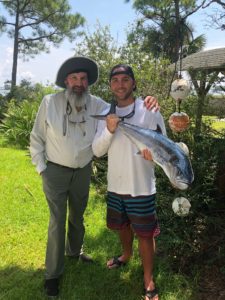
Tony with his father, John, a heart recipient.
In mid-August 2019, John stopped at Krispy Kreme to buy donuts for his son’s fire station, when he passed out. He was transported to Mayo Clinic Hospital in Jacksonville, where he was immediately listed for a heart transplant. He remained hospitalized until his transplant, which miraculously came just two weeks later.
“I’ve always been an organ donor, but I’m quite appreciative of someone’s sacrifice for me,” John said. “I’ll donate anything I can, and I encourage others to register as donors. It may not be for them. It may be a family member or close friend in need. What good will the organs do for you? They will just go to waste.”
Allie and Tony plan to marry in October 2021, and their family will be profoundly connected through the Gift of Life.
“I love the concept that just because your life is over, life isn’t actually over,” Allie said. “Your life can continue through donation. It continues on at multiple levels, both in who you’re donating to, but it also continues in the life of the recipient’s family. Donation continues life for everyone involved.”

